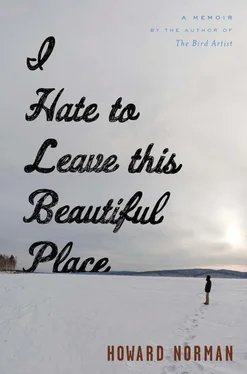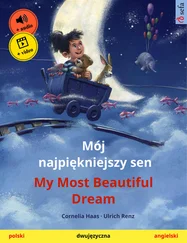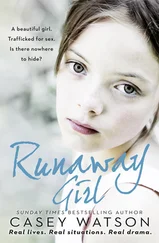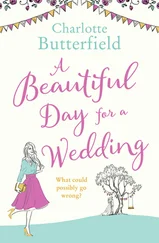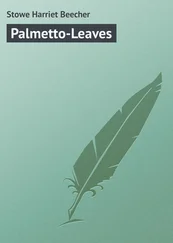When referring to these documentary works, Mathilde was measured if not dismissive. “I don’t regret painting them. It felt like I was saying to my mother, I know where you come from. But I gave every last painting away. Finally they felt more like an obligation, things I was supposed to paint. Nothing wrong with that, but I couldn’t paint out of obligation anymore, pure and simple. But don’t tell me life isn’t strange. Who could’ve predicted, the first time I went out there, the effect Saskatchewan would have on me? It was like my soul had new eyes. I felt my soul come alive. Like in my past life, I was actually part of that landscape. I thought, Now I’m me, present-day Mathilde, but painting my former self. That’s probably kind of Buddhist.”
“We should elope,” Mathilde said. We were walking on Water Street near Historic Properties. “I’ve always wanted the experience of eloping.”
“Elope to where?” I asked.
“I was thinking Saskatchewan.”
“Knowing you,” I said, “you’d want to get married standing out on some godforsaken prairie.”
“Godforsaken?” she said. “I don’t think that’s true at all. I find God out there.”
“An abundance of churches doesn’t necessarily mean hospitality.”
“What’s bugging you? Is it our age difference again? The age difference bothers you a lot, doesn’t it? Let me put it this way. I’ve already tried older. Now I’m trying younger.”
For whatever reason, hearing herself utter this made Mathilde double over in laughter. Other pedestrians out in the bitter cold that day stared at us. Then, as if by some telepathic communication, we both noticed we were standing in front of a small art gallery. Wordlessly we agreed to go inside. It had begun to snow. The gallery was nearly empty. Tea, hot cocoa, wine, cheese, and crackers were laid out on a long table. Mathilde was immediately drawn to a painting called Grey Geese Descending. I got two paper cups of cocoa and joined her.
Grey Geese Descending was about twenty-four inches wide and eighteen inches high, and showed five grey geese about to alight on a pond. Their wings were spread to slow and balance their gliding descent. One appeared to be mishandling its approach, its body slightly contorted, its feathers decidedly more ruffled than the others’, as if its flight through the mountain pass and valley in the background had been more harrowing, as though the gods of travel themselves had put up resistance.
Mathilde stepped back and pointed to the disheveled goose. “See, that’s what happens when it got confused.”
“I had no idea you could read the minds of Japanese geese.”
“I never told you that?” She was keeping things light.
“Melancholy day, isn’t it?” I said. “In the painting, I mean. Overcast sky and everything.”
“Geese may not get sad about the same things you get sad about. Besides, overcast skies are better to see birds by. Haven’t you noticed that?”
“Yes, I have.”
“I mean, you love to go out and look at birds over at Port Medway, and even at the harbor here in the city, right? I like to see crows against the grey skies out in Saskatchewan. Then there’s my seagulls everywhere that I love so much. That’s something we truly have in common, right? That and things that go on with us under the quilt. Tell me, do you like this painting or not?”
I said, “You make decisions, like or dislike, faster than me.”
We looked at all the paintings and some scrolls, drank hot chocolate and wine, and ate cheese and crackers, everything that was on offer. It was our dinner. We were in the gallery for about half an hour, I’d say. Then we repaired to a student café on Duke Street near the Nova Scotia College of Art and Design. We took a window-side table. When our espressos arrived, Mathilde said, “I’ll elope with you if we can come to some agreement about that painting we just saw. And don’t act like you’re merely resigned to talking about this. I want you to be interested.”
Just then, for all her insistence, as she sat across the wooden table from me, her coat and scarf still on, I got lost in her physical self— entranced might be the word — as if I were memorizing her. This no doubt doesn’t speak well for me: shouldn’t one live fully in the moment. Still, there it was. Barely shoulder-length black hair with two red streaks swirled up in a topknot and tucked under her knitted hat, skin flushed from the cold, brown eyes wistful even when she was joyful, prominent cheekbones, and her nose — which, as she had put it, “I only liked after it was broken when I was playing high school lacrosse,” and which had been broken a second time when she’d taken a spill from a moped. She had a slightly tilted smile that thrilled me.
Almost without reprieve, we had been out of sync with each other, contentious, all without discussion, for about a week. The most vexing aspect of this was to experience the symptoms of Mathilde’s discontent without knowing if there was an exact cause. She’d been painting for upward of eighteen hours a day. I hadn’t discovered a passion even remotely comparable. I liked to read and look at birds and compose long handwritten letters. But I sensed that liking wasn’t enough to fill a life.
“Where are you?” she asked.
“Sorry, I drifted off.”
“We should talk about the painting. I think we saw it differently.”
We sat there until the café closed, which must’ve been midnight at least. Grey Geese Descending was ostensibly the subject at hand. But for the next few hours deeper information about each other was also being requisitioned. Hard to describe this, but I believe we both knew something was ending. Then, either you have to start a second romance within the first or all is lost. More likely, Mathilde knew it, and I didn’t want to know it. After her death, I understood that by presenting the offer—“I’ll elope with you if we can come to some agreement on the painting we just saw”—she might have intended it as a kind of fait accompli, since she knew in advance that we would not agree. To put it another way, if in the end this conversation wasn’t intended to be a kind of elegy, each sentence we spoke seemed tense with elegiac anticipation. Half an hour into it I wanted the conversation to stop, and Mathilde seemed about to ask the café’s proprietor to let us stay the entire night in order to continue it.
I thought Grey Geese Descending, in every specific and general aspect, was an allegory of sadness; conversely, Mathilde saw it as having captured “the mood of the painter and therefore the mood of the landscape itself.” She said, “You don’t really know enough about psychology to psychologize so much about this painting. That kind of talk keeps you from feeling the beauty of it.”
I said, “You’re the one who tried to tell me what that goose was thinking — that it was hesitating to land.”
“Stop reading yourself into the painting.”
On and on like that. It would have been wonderful if we were simply using different sensibilities to come to a mutual understanding, a duet of opposite natures, but this was more an exchange, in self-consciously subdued voices, of a maddening civility that might more characterize the first conversation between two people trying to get to know each other. Then, minutes before the café closed, Mathilde asked with huffy directness, “Did you realize that my saying we should elope was a marriage proposal?” I said, “But since you didn’t invite me to Saskatchewan—” Mathilde said, “We can elope right here in Halifax.”
Using a directory and the café’s telephone, we woke up a justice of the peace at one A.M. and walked to his house. After a few perfunctory questions, he said, “This can’t legally work. You, sir, are an American citizen, and you, madam, are a citizen of Morocco. Also, you need a witness.” Mathilde said, “We can be our own witnesses.” “Not on paper,” the justice of the peace said. We shrugged, apologized for waking him but not for the reason we had woken him, and left, acquiescing for the moment to international legalities.
Читать дальше
